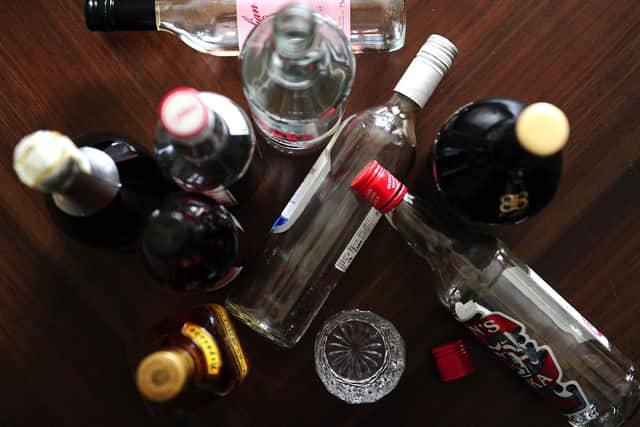Covid Scotland: Lockdown saw more people drinking alone, at home and later in the day
and live on Freeview channel 276
The study from Glasgow and Sheffield Universities also found an increase in drinking alone in Scotland than England, though experts said this could be explained by a higher proportion of people living on their own north of the border.
In response to the research, Alcohol Focus Scotland said work must be done to prevent lockdown habits becoming long-term trends.
Advertisement
Hide AdAdvertisement
Hide AdThe study measured the impact of Covid-19 restrictions in 2020 on drinking habits, using data on almost 300,000 adult drinkers in Scotland and England.


It found that there was no statistical difference in the total number of alcohol units consumed each week during different periods of the first year of the pandemic.
However researchers found that lockdowns appeared to be linked to a shift in habits to at-home, late evening drinking.
Dr Iain Hardie, of the University of Glasgow MRC/CSO Social and Public Health Sciences Unit and lead author of the study, said: “Going forward it remains unclear what the long-term consequences will be of the changes in alcohol consumption in 2020.
Advertisement
Hide AdAdvertisement
Hide Ad“With hospitality premises back operating at closer to full capacity it’s likely that alcohol consumption in these venues will move closer to pre-pandemic levels, although they could potentially decline again in response to new variants if restrictions are reintroduced or people are afraid of indoor spaces.
“However, the increase in home drinking in 2020 is a concern. We know from other studies that alcohol-related harm has risen during the pandemic. The increase in home drinking is likely to have contributed to this.
“In the past, home drinking has been a relatively under-researched topic, and there is now a need to monitor it more going forward to find out whether these home drinking habits picked up by people in 2020 become a new norm within people’s drinking behaviour.”
The research team studied 41,500 adult drinkers in Scotland and more than 250,000 in England, focusing on the original March 2020 lockdown, the easing of restrictions in July 2020 and the onset of further restrictions in September 2020 until December 2020.
Advertisement
Hide AdAdvertisement
Hide AdThe consumption of shop-bought alcohol increased following the March 2020 lockdown and remained higher than previous years, even when lockdown were eased.
Meanwhile alcohol consumption in hospitality premises decreased following the March 2020 lockdown and remained lower than previous years throughout the remainder of 2020.
The researchers believe this is most likely to be explained by three reasons, one being that even when on-trade premises reopened they were operating at reduced capacity.
Another is that some venues, such as nightclubs and live music venues, remained closed, while some people will have continued to stay away from hospitality settings even in periods when restrictions eased because they were worried about catching Covid-19.
Advertisement
Hide AdAdvertisement
Hide AdDr Abigail Stevely, from the University of Sheffield’s Alcohol Research Group and co-author of the study, said: “Despite some concerns that people might drink more in the daytime, we actually found that there was a shift towards people starting drinking later in the evening during lockdown restrictions.
“There is evidence from other studies that heavier drinkers may have increased their consumption.”
In response to the findings, Alison Douglas, chief executive of Alcohol Focus Scotland habits appear to have become more polarised during the pandemic, with some people cutting down and others, particularly heavier drinkers, drinking more.
“We have already seen a profound impact from pandemic drinking, with a devastating rise in deaths from alcohol in 2020,” she said.
Advertisement
Hide AdAdvertisement
Hide Ad"We must prevent this from becoming a longer-term trend by prioritising helping people to reduce how much they drink.”
The charity has called for an increase in support for those who need it, reducing alcohol marketing and an increase in minimum unit pricing to 65p per unit.
The research is published in the journal Addiction.
A message from the Editor:
Thank you for reading this article. We're more reliant on your support than ever as the shift in consumer habits brought about by coronavirus impacts our advertisers.
If you haven't already, please consider supporting our trusted, fact-checked journalism by taking out a digital subscription.
Comment Guidelines
National World encourages reader discussion on our stories. User feedback, insights and back-and-forth exchanges add a rich layer of context to reporting. Please review our Community Guidelines before commenting.